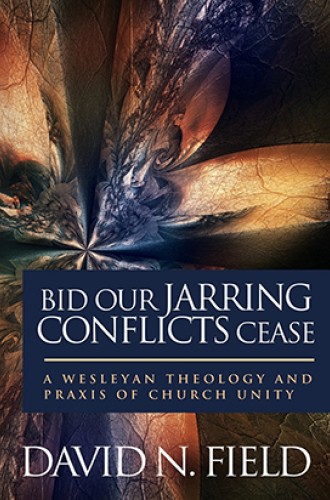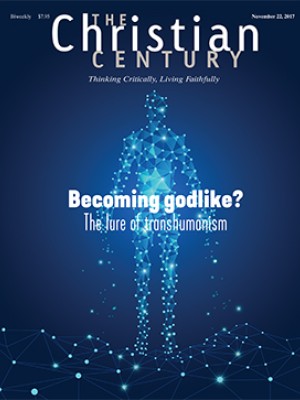Can John Wesley's theology keep the Methodists united?
David Field's question is spiritual: How do we hold ourselves in right relation to those with whom we disagree?
“If we do not yet think alike, we may at least love alike,” wrote John Wesley. David N. Field’s careful and accessible study of what it means to love alike arrives in a time of tumult as the United Methodist Church struggles to resolve a decades-long conflict about LGBTQ ordination and same-sex marriage. Many United Methodists long for a resolution that holds the church together and is spiritually livable, even spiritually liberating, for all involved. Field is one of the 32 people charged with envisioning possible UMC futures through the Commission on a Way Forward in advance of the February 2019 special General Conference.
In this book, however, Field says little directly about the debate on LGBTQ inclusion and human sexuality. Instead, he mines Wesley’s writings to ask a more general question: whether and how Christians might maintain a spirit of unity despite sharp internal disagreements within the church. Field draws heavily from Wesley’s sermons “Catholic Spirit” (1749) and “A Caution against Bigotry” (1750), but he also incorporates an array of Wesleyan writings on ecclesial unity. He is less interested in the pragmatics of a possible polity restructure (the decision) than he is in the spiritual work of unity and holiness (the process). How do we hold ourselves in right relation to those in the church with whom we profoundly (and perhaps permanently) disagree?
Read our latest issue or browse back issues.
According to Field’s reading of Wesley, being in community with people with whom we have fundamental theological disagreements can provide a vital means of grace, a path to grow in faith and inner holiness as we learn to love those we find difficult. Field quotes Wesley: “orthodoxy or right opinions is at best but a very slender part of religion, if it can be allowed to be any part of it at all.”
Wesley isn’t arguing here that opinions are irrelevant; after all, opinions help shape “practices and tempers.” Rather, he’s cautioning against bigotry. Fields explains: “Bigotry occurs when we are not ready to believe that those who disagree with us can be God’s instruments in carrying out God’s mission in the world.” The “catholic spirit” that offers a corrective to bigotry, however, is not a laissez-faire liberalism, a live-and-let-live stratagem of noninterference that feigns polite agreement. “A catholic spirit is the recognition and affirmation of the holiness of those with whom we have significant disagreements.”
The Wesleyan tradition not only allows us to try and correct each other’s errors; it practically requires this behavior. However, for Wesley, the “invincible ignorance” and “invincible prejudice” of theological opponents are not incompatible with their personal holiness and nearness to God. In other words, someone might be terribly wrong (even on a matter of grave importance) without being terribly bad.
People of good faith within the UMC are trying mightily to display the “bias to unity” that Field enjoins, seeking solutions in a spirit of love and goodwill. Yet, with the heartbreak of church trials, growing public dissent from the Book of Discipline, and high-publicity disciplinary hearings for LGBTQ church leaders, it seems difficult to imagine that the current situation can hold much longer. Both sides may soon reach a breaking point. According to Field, Wesley allows that the division of a church might be necessary and acceptable, particularly when “remaining as members of that particular institutional church requires people to do something that they are convinced that the Word of God forbids” or “prevents people from doing something that they are convinced the Word of God requires them to do.”
In my own experience, this describes the situation for many United Methodists who feel they can no longer deny ordination to “self-avowed, practicing homosexuals” nor refuse to officiate at marriages of deeply committed, loving same-sex couples while still living faithfully in adherence to their understanding of God’s call. However, the deeply held convictions on the other side, a tightly interconnected polity, and the numbers all suggest that solutions will be difficult to find. The tension may become just too much to bear. If so, then split we will—and perhaps, even according to Wesley, split we must.
Wesley himself played multiple roles. He was an occasional ecclesial enforcer in the early Methodist movement, using his authority to kick out those he believed were teaching falsely. However, he also openly disobeyed the authority of his own ordaining body, the Church of England, to pursue what he believed to be a higher gospel purpose. All the while, he advocated remaining part of the church in order to reform from within, even as he made his own parallel structure. In other words: it’s been complicated for centuries.
As difficult conversations loom over the next few years for the UMC, Field offers guidance: (1) “Love one’s neighbors, even if one regards them as the enemies of God.” (2) “Seek their spiritual welfare and thus in a loving and respectful manner [explain] one’s own position and why one believes the other’s position is wrong.” (3) “Affirm them as a neighbor in whom God is at work.”
Field also reminds us that a church split need not become a church schism. If workable unity isn’t possible, or would come at too high a cost, then we must seek a loving separation that is charitable, equitable, kind, and just. This is difficult discipleship, because the spiritual temptations Wesley describes remain as strong today as they were in the mid-1700s: imputing bad motives to our enemies, thinking ourselves infallible, pride, bitterness, and unkindness. If a split is laced through with these sins—or, even worse, if we split simply because we can’t be required, any longer, to love people who seem to us so wrong—then we must confess, repent, and correct our course.






